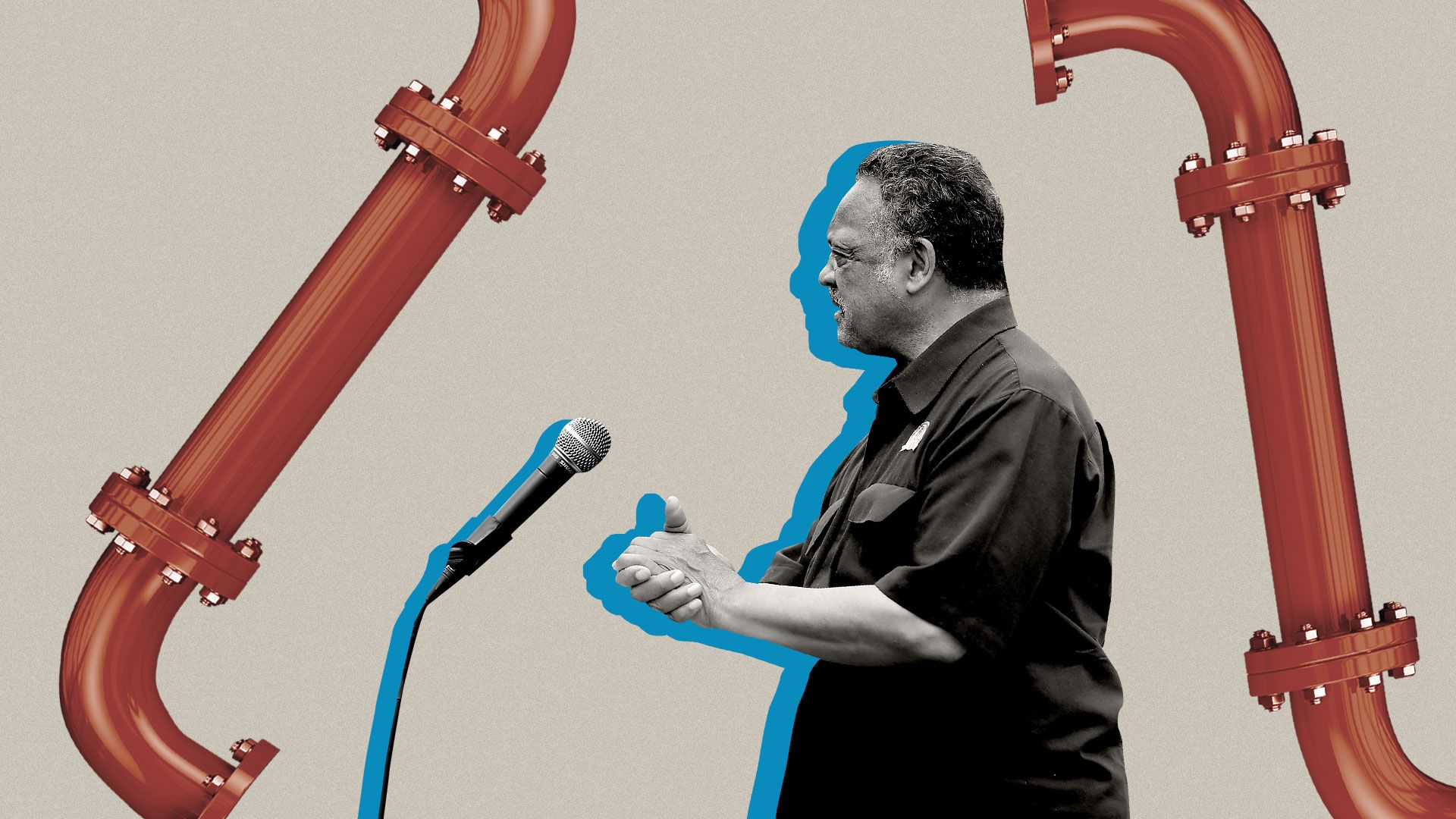Inside Rev. Jesse Jackson’s push for a natural gas pipeline

Photo illustration: Eniola Odetunde/Axios. Photos: Win McNamee/Getty Images
Breaking from other progressives, Rev. Jesse Jackson is calling to build a natural gas pipeline to serve an impoverished community near Chicago.
Why it matters: This is one example of the complex tug of war between energy affordability and tackling climate change. The tension is poised to grow as America and much of the world careen into pandemic-fueled recessions.
Driving the news: The move puts Jackson at odds with some Democrats and environmentalists who oppose fossil fuels because they drive climate change. The famous civil rights activist says the largely black community is being unfairly cut off from affordable energy.
The intrigue: For several months Jackson has been working with local, state and federal officials in Illinois to get an $8.2 million, 30-mile natural gas pipeline built for a community in a rural part of Illinois 65 miles south of Chicago.
- Jackson, who has protested with environmentalists to oppose the Dakota Access oil pipeline, told me in a February interview: “I really do support the environmental movement.”
- However, he said, the people of this community — called Pembroke — have no gas at all and are paying exorbitantly high prices to heat their homes with propane.
- “When we move to another form of energy, that’s fine by me, I support that,” Jackson said. “But in the meantime, you cannot put the black farmers on hold until that day comes.”
Where it stands: The area has about 400 homes, no manufacturing and only a few commercial establishments, said Mark Hodge, mayor of Hopkins Park, a town in the region.
- The community is 80% black and has an average annual income of less than $15,000, Hodge said. That’s compared to more than $60,000 nationally.
- The region, due at least partly to its rural setting, has never had access to natural gas. The topic is reaching the forefront now because Jackson has been focusing on it since last fall, largely at Hodge's request, the mayor said.
What they’re saying:
- Cathy Vanderdyz, a city clerk in the area, said she pays roughly between $500 and $800 to heat her home with propane over the course of a month or two.
- Hodge says businesses won’t come to the area because heating costs are too high. As for climate change: “It's not on my radar at this point, not to say in the future it would not be. My main concern is cutting our energy costs out here.”
- Hodge said he considered a 137-acre solar farm. He said he was told it would cost $25 million to run an electric line to connect it: “So of course we did not move forward with that.”
While natural gas is cheaper per unit of energy compared to other forms, the upfront cost is typically a deal-breaker in rural areas not already connected to a pipeline network — regardless of the income level and race of people living there, said Warren Wilczewski, an expert at the U.S. Energy Information Administration.
- Because energy prices are roughly the same for everyone, people with lower incomes pay a larger share of their income on energy.
- This is especially so in black and Hispanic communities, where poverty rates are higher.
By the numbers: Under current regulations, customers seeking natural gas access often have to pay for at least part of the cost of getting that service.
- In this case, the roughly 400 Pembroke households would have to pay $3.25 million of the total estimated $8.2 million pipeline, according to Nicor Gas, the company that would build the project.
- That means each household would, on average, have to pay an upfront cost of $8,125 to be connected to natural gas.
- “This is why propane is viable,” Wilczewski said.
What we’re watching: A bill pending in the state legislature would designate Pembroke as a “designated hardship area,” which would allow a company (in this case Nicor Gas) to pay for the entire cost of the pipeline, not just part of it.
- Nicor would increase natural gas rates throughout its service area to cover costs. With 2.2 million customers in the region, that’d equal about a penny a month, a Nicor Gas spokeswoman says.
The other side: Environmentalists aren’t fighting this pipeline project, but Tamara Toles O'Laughlin, North America director for 350.org, one of the most influential climate activist organizations in the world, said it fits within the group’s mandate to end fossil fuels.
- “If there’s one thing this pandemic is teaching us, it’s that we need to think about recovery in the long-term and that also means thinking about sustainable energy needs in the long-term,” she said, adding she is open to talking with Jackson and others pushing the project.
Go deeper:
- Exclusive: Civil rights leaders oppose swift move off natural gas
- Communities of color face brunt of fossil-fuel pollution too
Editor’s note: This story has been corrected to show that it would be natural gas rates (not electricity) that would increase under the proposed bill.
